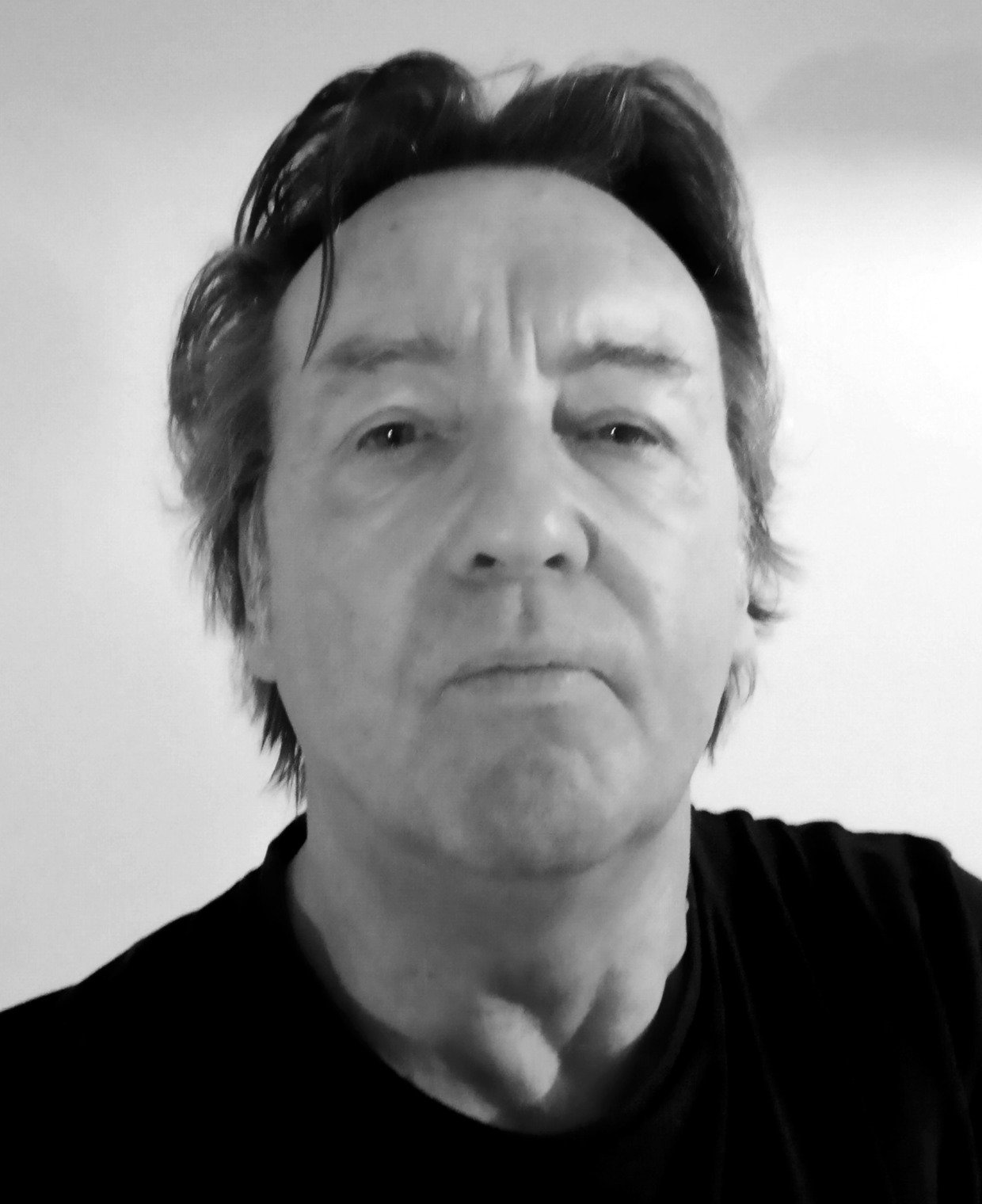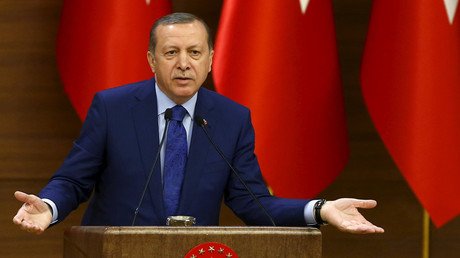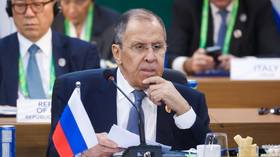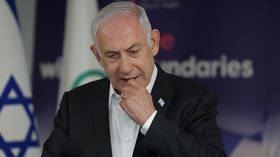Turkish repression targets Germany, Russia as EU panders to Erdogan’s autocratic regime
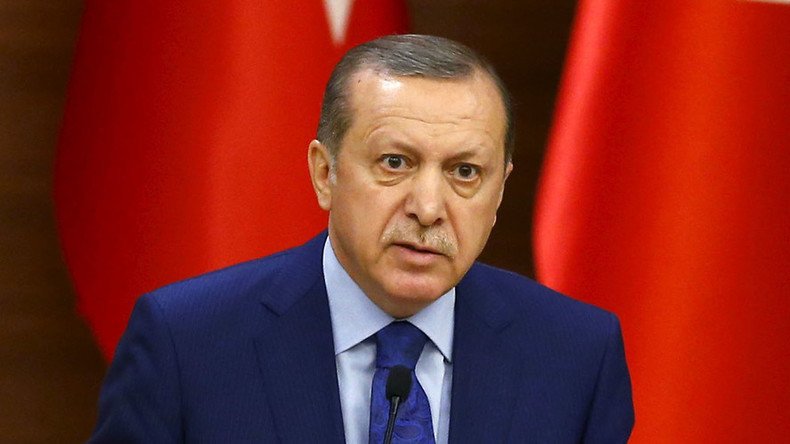
Turkey’s President Erdogan wants Germany to jail one of its TV satirists, and has also this week shut down a Russian news website. Europe’s pandering over the refugee crisis is unleashing Erdogan’s autocratic streak.
It seems something out of a satire. This week Turkey’s President Recep Tayyip Erdogan filed criminal proceedings against a well-known Germany comedian over a television sketch in which he crudely mocked the Turkish leader.
The complaint was sent to the German Foreign Ministry, reportedly at the personal behest of Erdogan. And, incredible as it might seem, Chancellor Angela Merkel’s government has reportedly consented to the prosecution going forward.
If the comedian – Jan Boehmermann – is found guilty of defaming Erdogan he could face three years in jail under an arcane German law which forbids profanity towards foreign leaders.
DETAILS: Boehmermann warned the reading would breach regulation on insulting foreign leaders https://t.co/TEKeeHc2S1pic.twitter.com/tYwFhhyiga
— RT (@RT_com) April 15, 2016
The dramatic development comes in the same week the Turkish broadcasting regulator shut down the country’s website service belonging to Russian news channel Sputnik. It is not clear why the Turkish authorities took the measure, but “national security” concerns were reported and the fate of the channel is now dependant on a court case. The move prompted Sputnik editor-in-chief Margarita Simonyan to decry freedom-of-speech violation.
Ironically, also this week the European Parliament in Strasbourg voted overwhelmingly for a resolution that condemns what it calls Turkey’s repression of democratic rights and media freedom in particular. Repression in Turkey has been steadily mounting since Erdogan became president in 2014.
Currently there are some 2,000 legal cases pending against journalists, academics, artists and members of the public who are deemed by the Ankara authorities to have “insulted” the presidency or other institutions of state.
Earlier this month, two senior journalists, Can Dundar and Erdem Gul, editors at the daily newspaper Cumhuriyet were on trial over “espionage” charges.
Last year, their newspaper published an article on alleged cross-border weapons smuggling by Turkish state intelligence to militants in Syria. The report was accompanied by photographic evidence purporting to show humanitarian aid supplies were providing cover for large quantities of concealed weapons. Erdogan personally intervened in the case and has accused the journalists of treasonous conduct. If convicted, they could face life in prison.
READ MORE: Turkish weapons ‘heading to end in ISIS hands’: RT speaks to Cumhuriyet journalists
Last month, Turkish police raided the offices of the biggest opposition newspaper, Today’s Zaman. Senior editorial staff were sacked and replaced by appointees loyal to Erdogan’s ruling Justice and Development Party. The news outlet has since adopted a decidedly pro-government editorial stance.
Erdogan’s sensitivity to criticism seems to know no bounds. One Turkish man was prosecuted over social media posts he had made that appeared to compare the Turkish president with Gollum, the creepy fictional creature from Tolkien’s Lord of the Rings.
The repression of critical media comes amid the backdrop of a severe security crackdown by Ankara on separatist Kurdish regions. As many as 400,000 people have been displaced over the past year since Turkish state forces resumed open hostilities against the Kurdish guerrilla PKK movement. There have also been reports of mass killings by Ankara’s security forces in Kurdish cities in the south east of the country.
Human rights violations by the Erdogan government have been well documented by international rights groups and the EU, culminating for instance in the parliamentary resolution in Strasbourg. Still, European governments have maintained a studied silence over Ankara’s troubling transgressions.
This is obviously because the EU – and Germany in particular – is desperate to keep favor with Ankara over the refugee crisis. Last month, the EU signed a deal with Turkey in which tens of thousands of refugees currently stranded in Greece are to be forcibly returned to Turkey, allegedly for an orderly registration process for those seeking asylum in Europe.
Chancellor Merkel has been facing a political backlash in her own country and across Europe for her previous “open door” policy towards immigrants mainly fleeing Syria to Turkey and thence to Europe. The EU-Turkey arrangement is intended to slow down the influx of refugees.
However, the refugee deal has come under fire from rights groups for allegedly violating international law and the EU’s own treaties on asylum. Some commentators have even gone as far as slamming Turkey for “blackmailing” the EU over the crisis. The doubling of EU aid to Turkey, at Ankara’s insistence, to some $6.6 billion, and the strong-arming of pledges to fast-track membership of the bloc – all suggest that Erdogan does indeed have the upper-hand in extracting concessions for his government’s cooperation in handling the refugee problem.
The blatant repression under Erdogan of Turkish media and the Kurdish minority also indicates that the increasingly autocratic leader knows that he has the EU over a proverbial barrel. Erdogan’s regime seems emboldened to do whatever it wants, knowing that the European governments need his favor in mitigating the refugee crisis.
This week, while hosting national leaders at a summit of the Organization for Islamic Cooperation, in Istanbul, Erdogan issued a haughty rebuke of Western countries for their “ambivalence” towards fighting terrorism. This was a veiled reference to Belgium and France over jihadist terrorists traveling from there to Syria.
Much more pertinent is Turkey’s bigger role in supplying fighters, and weapons, including industrial chemicals, as well as smuggling of oil and antiquities, to fuel the conflict in Syria, as reiterated again this week by Vitaly Churkin, the Russian ambassador the United Nations Security Council. One wonders if Churkin’s scathing broadside against Ankara at the UN this week was related to the decision to shut down Sputnik’s Turkish website?
‘Dangerous, disproportionate’: Sputnik shutdown in Turkey slammed by OSCE, rights activistshttps://t.co/7RJnVlOQdMpic.twitter.com/i4WSGA1rUE
— RT (@RT_com) April 15, 2016
When German media first reported earlier this week that Turkey was pressing ahead with a formal complaint against satirist Jan Boehmermann for his disparaging TV skit against Erdogan, it was notable that Merkel was in a bind. She quickly telephoned Erdogan’s Prime Minister Ahmet Davutoglu in a damage limitation exercise, while to the German public she appeared to give a spirited defense of “artistic freedom”.
Merkel’s government now seems to have relented in the face of Turkish diplomatic pressure to proceed with a prosecution against the comic that could see him wind up behind bars.
Is this the kind of regime the EU is seriously considering admitting to its ranks? One that has been evidently involved in sponsoring terrorism, withering repression against minorities and locking up anyone who dares to criticize its autocratic ruler. The fact that Erdogan’s Turkey is now going after international media in Germany and Russia shows that homegrown despotism has taken on megalomaniac proportions well beyond its borders.
It also demonstrates how feeble and expedient the EU is. Despite high-minded proclamations about democratic rights, it is obvious that when base needs are pressing, the EU government is prepared to stoop to any level. Getting a squalid fix over a refugee problem – a problem the EU and Turkey have created in the first place by colluding with Washington’s regime-change covert war against Syria – is the height of expedience.
It should be recalled too how EU governments appeared to make a defiant defense of free speech over the killings by Islamists at the Charlie Hebdo magazine in Paris last year. The magazine’s routine profane mockery of Islam was defended as “a European principle of free speech”. Now, however, when self-serving political calculations shift for expediting a refugee deal with Turkey, the supposedly hallowed right to free speech seems to be expendable.
Pandering to a rogue regime in Turkey – even if that means locking up your own citizens – is a sign of just how craven and unscrupulous EU leaders are. Principles, treaties, rights, freedoms – they are all disposable when push comes to shove.
The statements, views and opinions expressed in this column are solely those of the author and do not necessarily represent those of RT.
